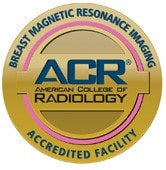MRI
 A magnetic resonance imaging (MRI) scan is performed inside a large, open-ended cylindrical magnet that has a patient table in the center. MRI uses a strong magnetic field and radio waves to make highly detailed images of the body. Because of this strong magnetic field, it’s important to let the technologist know of any metal on or in your body.
A magnetic resonance imaging (MRI) scan is performed inside a large, open-ended cylindrical magnet that has a patient table in the center. MRI uses a strong magnetic field and radio waves to make highly detailed images of the body. Because of this strong magnetic field, it’s important to let the technologist know of any metal on or in your body.
Some MRI exams require an injection of an MRI contrast or dye. Typical MRI studies take about 30 to 60 minutes. To ensure accurate imaging, it’s important to remain still during the exam.
All MRI exams are interpreted by a board-certified radiologist with special training in MRI. Magnetic resonance imaging is commonly used to examine the brain, spine, joints, abdomen, breast, prostate, heart and blood vessels. Images created by the MRI scanner are performed without the use of radiation.

How is the MRI performed?
You will lay on a moveable exam table. Often a coil or antenna is placed around the portion of your body that is being examined. The exam table will then be moved into the MRI machine. The MRI technologist will perform the test in an adjacent room while watching you through a window. You will be able to communicate with the technologist throughout the exam. During the exam, the MRI machine makes loud thumping noises, so we will provide earplugs or music for your added comfort.
If Contrast Dye is Needed
Depending on your doctor’s order, you may need a contrast or dye to better visualize the body part being scanned. If intravenous contrast is requested, your blood will be tested for kidney function prior to the injection. If you had a prior reaction to contrast or have any concerns about a possible reaction please contact your doctor before your exam or speak with the MRI Technologist prior to your appointment date.
Preparing for your MRI
- You will be asked to arrive 15 minutes prior to your appointment to register for your exam. A typical procedure averages 45 minutes depending on the information required by your doctor.
- Wear comfortable, metal-free clothes that are easy to change as you may be asked to wear a gown for their procedure.
- Because of the magnetic field in the magnet room, you will be asked to leave metal items in a locker outside the scan room such as jewelry, eyeglasses, key, phones and other metal objects.
- You will be asked to complete a standard MRI screening questionnaire to ensure that you are able to safely enter the MRI area. The technologist will review your past surgical history and if you have had brain, ear, eye or other surgeries that involved:
-
- Aneurysm clips
- Exposure of metal fragments to your eye
- Heart valve replacements
- Insulin pump
- Metal Implants
- Neurostimulators
- Pacemaker
- Shrapnel
Wider Opening Option
If you’re anxious or have a fear of smaller spaces, Silver Cross offers wide-bore MRI, allowing you to have the same tests done without being put inside a narrow cylinder.
If you have any concerns about claustrophobia, please contact your doctor before your exam. He or she may decide to prescribe a mild sedative to relax you during the exam or if ordered by your doctor, we offer an I.V. sedation program administered by an anesthesiologist to insure you the most relaxed experience possible during your MRI exam. For your safety, sedated patients must have someone to drive you home.
Here are some of the MRI services we offer: